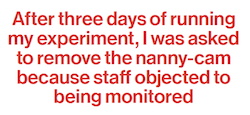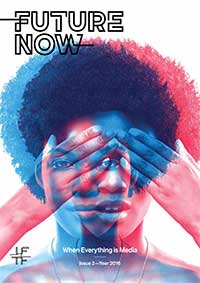Future Now
The IFTF Blog
Daddy Cam
An experiment in compassionate surveillance
 Before my father fell ill and was admitted to a long-term care facility, checking in on him used to be as simple as a quick phone call or email. But after he was admitted, my calls had to be planned around his care providers’ schedules, and even then, they frequently went unanswered. When I did manage to get through, my dad’s providers often couldn’t give me accurate or complete accounts of his status. On top of that, knowing the burden that these requests made on the staff caused me to hesitate to call at all.
Before my father fell ill and was admitted to a long-term care facility, checking in on him used to be as simple as a quick phone call or email. But after he was admitted, my calls had to be planned around his care providers’ schedules, and even then, they frequently went unanswered. When I did manage to get through, my dad’s providers often couldn’t give me accurate or complete accounts of his status. On top of that, knowing the burden that these requests made on the staff caused me to hesitate to call at all.
I began to think about easy-to use, non-burdensome technologies that might help me monitor my dad’s status. I tried landline phones, cell phones, computers, and tablets. I tested these devices remotely from my hotel room across town. My most successful experiment was to install a “nanny-cam” in my dad’s room. This device allowed me and other family members to remotely check in with dad at all hours of the day or night. With the camera, I could listen in (synchronously or asynchronously) on conversations he was having with the care staff, monitor his sleep, observe his physical therapy sessions, see how and what he was eating (or failing to eat), and even talk to him, all with no effort on the part of his providers or his own.
I was able to program the camera to alert me if he got out of bed when the staff expected him to be sleeping, and alert the staff to go check in on him. The camera’s software helped me to quickly distinguish periods of activity from periods of inactivity. Overall, the camera’s effect was profound—for the first time since my dad was admitted, I felt truly connected, was able to know what was happening at any moment, was better able to see recurring patterns in his behavior, and was better able to initiate discussions about how to make him more comfortable. With the non-clinical data I had collected, I was able to see how my father’s sleep led to frequent missed meals and blood sugar emergencies, and how lapsed hygiene protocols led to interrupted sleep.
 After three days of running my experiment, I was asked to remove the nanny-cam because staff objected to being monitored, and because continuous data capture and monitoring would bring up confidentiality, privacy, and liability issues and concerns that the facility was not equipped to deal with. These are similar to the issues and concerns we’re seeing in other contexts, such as workplace safety and law enforcement, where continuous data is being collected. As every facet of our lives becomes recordable, how might we distinguish what is important from what is unimportant? How might we determine what data should be shared from what should remain private? Who should have access to, or benefit from, what our recordings reveal? I am grateful for having had this unique window into my father’s life during a brief period. And I’m equally grateful that I was able to protect and control access to it so that I could be sure it was used for, and only used for, the purpose of making his life better.
After three days of running my experiment, I was asked to remove the nanny-cam because staff objected to being monitored, and because continuous data capture and monitoring would bring up confidentiality, privacy, and liability issues and concerns that the facility was not equipped to deal with. These are similar to the issues and concerns we’re seeing in other contexts, such as workplace safety and law enforcement, where continuous data is being collected. As every facet of our lives becomes recordable, how might we distinguish what is important from what is unimportant? How might we determine what data should be shared from what should remain private? Who should have access to, or benefit from, what our recordings reveal? I am grateful for having had this unique window into my father’s life during a brief period. And I’m equally grateful that I was able to protect and control access to it so that I could be sure it was used for, and only used for, the purpose of making his life better.
 FUTURE NOW—When Everything is Media
FUTURE NOW—When Everything is Media
In this second volume of Future Now, IFTF's print magazine powered by our Future 50 partnership, we explore the future of communications, tracing historical technology shifts through the present and focusing on the question: “What is beyond social media?”
Think of Future Now as a book of provocations; it reflects the curiosity and diversity of futures thinking across IFTF and our network of collaborators. This issue contains expert interviews, profiles and analyses of what today’s technologies tell us about the next decade, as well as comics and science fiction stories that help us imagine what 2026 (and beyond) might look and feel like.
About IFTF's Future 50
Every successful strategy begins with an insight about the future. Every organization needs to build the capacity to anticipate the future. The Future 50 is a side-by-side relationship with Institute for the Future; it’s a partnership focused on strategic foresight on a ten-year time horizon. With 50 years of futures research in society, technology, health, the economy, and the environment, IFTF has the perspectives, networks, signals, and tools to make sense out of the emerging future.
For More Information
For more information on IFTF's Future 50 Partnership and Tech Futures Lab, contact:
Sean Ness | [email protected] | 650.233.9517



